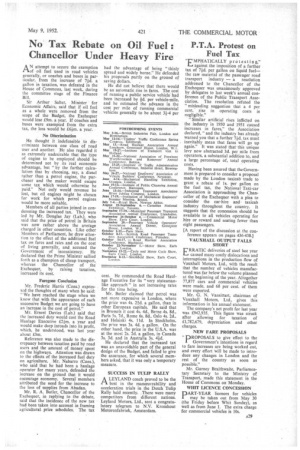No Tax Rebate on Oil Fuel : Chancellor Under Heavy Fire
Page 31

If you've noticed an error in this article please click here to report it so we can fix it.
A N attempt to secure the exemption r-kof oil fuel used in road vehicles generally, or coaches and buses in particular, from the increase of 7id. a gallon in taxation, was defeated in the House of Commons, last week, during the committee stage of the Finance Bill.
Sir Arthur Salter, Minister for Economic Affairs, said that if oil fuel as a whole were removed from the scope of the Budget, the Exchequer would lose £9m. a year. If coaches and buses were exempted from the extra tax, the loss would be £6m. a year.
No Discrimination
He thought it indefensible to discriminate between one class of road user and another. He also regarded it as extremely undesirable that the type of engine to be employed should be determined not by its real economic advantage, but " by the further calculation that by choosing, say, a diesel rather than a petrol engine, the purchaser and the maker would escape some tax which -would otherwise be paid." Not only would revenue be lost, but oil engines might be chosen for work for which petrol engines would be more suitable.
Members of all parties joined in condemning the increased tax. They were led by Mr. Douglas Jay (Lab.), who said that the price of petrol in Britain was now rather above the average charged in other countries. Like other Members of Parliament, he drew attention to the effect of the additional fuel tax on fares and rates and on the cost of living generally, and accused the Government of inconsistency. He declared that the Prime Minister sallied forth as a champion of cheap transport, whereas the Chancellor of the Exchequer, by raising taxation, increased its cost.
Foregone Conclusion Mr. Frederic Harris (Cons.) expressed the thoughts of many when he said: "We have reached the stage when we know that with the appearance of each successive Budget we are going to have an increase in the cost of petrol."
Mr. Ernest Davies (Lab.) said that the increased duty would cost the Road Haulage Executive £2-iin. a year and would make deep inroads into its profit, which, he understood, was last year about £3m.
Reference was also made to the discrepancy between taxation paid by road users and the amount of money spent on the highways. Attention was drawn to the effects of the increased fuel duty on agriculture. Mr. Nabarro (Cons.), who said that he had been a haulage operator for many years, defended the increase on the ground that it would encourage economy. Several members attributed the need for the increase to the loss of supplies from Abadan.
Mr. R. A. Butler, Chancellor of the Exchequer, in replying to the debate, said that the incidence of the new tax had been taken into account in framing agricultural, price schedules. The tax had the advantage of being "thinly spread and widely borne." He defended his proposals partly on the ground of saving dollars. .
He did not believe that there would be an automatic rise in fares. The cost of running a public service vehicle had been increased by id. per vehicle-mile, and he estimated the advance in the cost per mile of running commercial vehicles generally to be about 3I-4 per
cent. He commended the Road Haulage Executive for its "very statesmanlike approach" in not increasing rates for the time being.
Mr. Butler claimed that petrol was not more expensive in London, where the price was 4s. 21-d. a gallon, than in other European capitals. He said that in Brussels it cost 4s. 4d.. Berne 4s. 8d., Paris Ss. 7d., Rome 6s. 8d., Oslo 4s. 2d., and Helsinki 4s. lid. In Stockholm, the price was 3s. 4d. a gallon. On the other hand, the price in the U.S.A. was at the most 2s. 2d. a gallon, in Canada 3s. 3d. and in Australia 3s. qd.
He declared that the increased tax was an unavoidable part of the general design of the Budget, and failed to give the assurance, for which several members asked, that it was only a temporary measure.
SUCCESS IN TULIP RALLY
ALEYLAND coach proved to be the best in the manceuvrability and acceleration trials in the Dutch Tulip Rally held recently. There were many competitors from different nations. Leyland Motors, Ltd., sent a congratulatory telegram to N.V. Kromhout Motorenfabriek, Amsterdam.




















































































